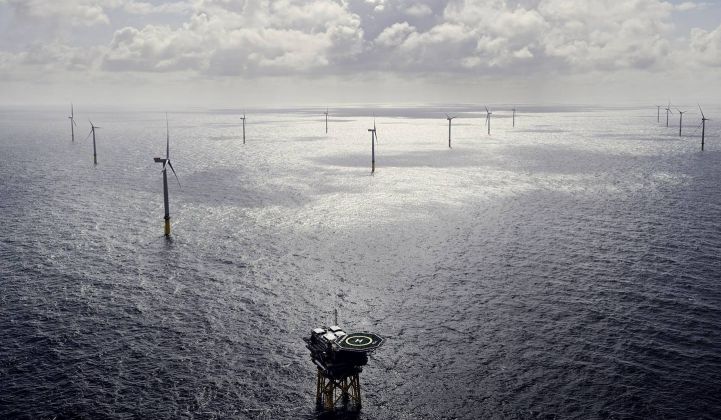Offshore wind has largely been stuck on the sideline of the corporate renewables market, as demand for onshore wind and solar has surged from corporate giants like Google, Walmart and even oil companies like Shell. That looks set to change.
Denmark’s Ørsted on Wednesday announced the largest-ever corporate offshore wind deal, with German chemical company Covestro signing up to take 100 megawatts of capacity from the upcoming 900-megawatt Borkum Riffgrund 3 project.
Earlier this year Google contracted with Engie for 93 megawatts of offshore wind capacity from the Norther project off Belgium, as part of its massive 1.6-gigawatt global renewables procurement.
Covestro's 10-year, fixed-price corporate power-purchase agreement with Ørsted will start in 2025, the year the wind farm is due for completion in the German North Sea. The price itself was not disclosed. Covestro is a major global producer of polymers, employing nearly 17,000 people.
These days, hardly a week goes by without the announcement of another big corporate renewables deal, as companies move to lock in competitive energy prices while lowering their carbon footprint.
So far this week, Amazon has announced three new solar projects totaling 329 megawatts in the U.S. and Spain, while EDF Renewables signed a 15-year PPA with Shell for a 132-megawatt solar project in California.
As much as corporations like to say they’re buying green power, cost remains the dominant factor in whether deals get done.
In the U.S., by far the world’s leading corporate renewables market, offshore wind remains in its infancy, and the offtake deals that have been made public with states and utilities remain expensive compared to other options for companies looking for clean power.
In Europe, however, offshore wind is no longer an outlier when it comes to cost. Europe’s first no-subsidy offshore wind bids emerged in 2017 in Germany for projects due in 2025; some of that winning capacity will be part of Ørsted’s Borkum Riffgrund 3 project.
Additional no-subsidy bids have followed, and analysts say Europe may soon begin seeing negative bids for offshore wind projects as aggressive developers bet that they will be able to make money in a world of rising wholesale power prices.
Meanwhile, the corporate renewables market has begun to flourish in Europe, perhaps making it inevitable that offshore wind developers would get in on the action.
Covestro’s decision to strike the PPA with Ørsted comes as the Frankfurt-listed company is “preparing...for the expected rise in energy prices and CO2 costs,” CEO Markus Steilemann said in a statement.
For Ørsted, the deal represents “the first tangible step to secure stable revenues for part of the power generated by Borkum Riffgrund 3, which will be built and operated without subsidies,” said Martin Neubert, CEO of Ørsted’s offshore wind business.
U.S. deals on the horizon?
While there have not been any corporate offshore wind deals announced in the U.S., electricity retailers are beginning to think about the potential for a future market.
Constellation, a Maryland-based power and gas retailer with 2 million U.S. customers, would “like to be involved [in offshore wind] in some form or fashion,” Shane Smith, managing director for strategic development, said in October at an event hosted by GTM.
While Constellation would be unlikely to develop or own offshore wind projects, it could take a role as an “intermediary," Smith said. “If our customers push us there, we’ll find a way to play.”
Last year Constellation struck a deal to sell power generated at an Illinois wind farm owned by Enel Green Power to more than 300 Starbucks coffee stores in the region.
Constellation is owned by Exelon, the largest U.S. operator of nuclear power plants. Ørsted is the largest owner of U.S. offshore wind projects, with a number slated for completion in the early to mid-2020s.




